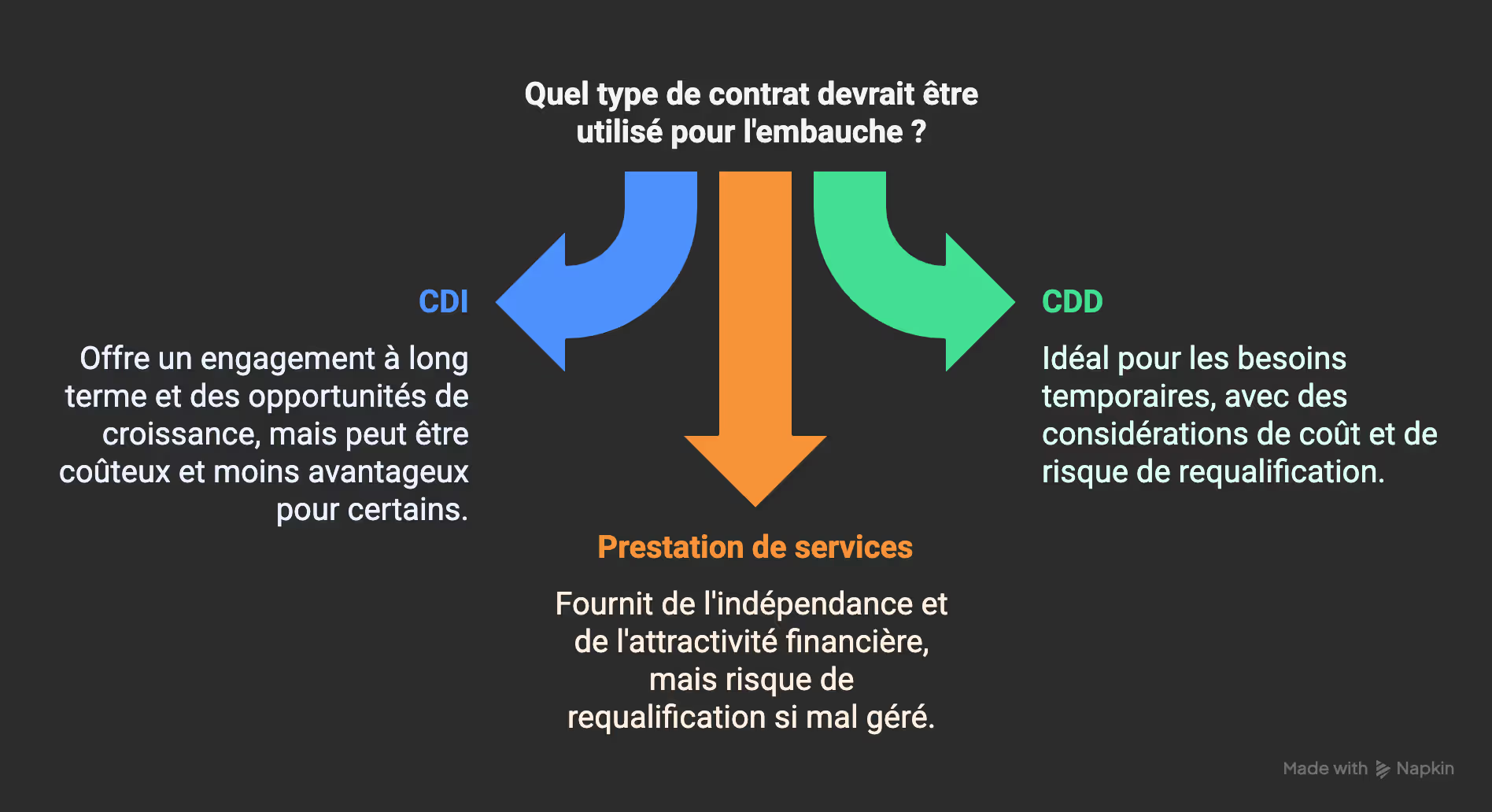Stuck on paperwork when it comes to working with a service provider? Don't panic: we'll explain how to build a solid service provider contract to secure your business transactions.
We review the essential clauses, the rights and obligations of each party, and tips for preventing disputes. Not forgetting the key point: setting fair compensation.
Want to boost your partnerships? It's this way.
Service contract: the basics you need to know
Definition and legal framework
A service contract organizes a collaboration between a professional and their client, in exchange for payment.
This type of agreement is based on Article 1710 of the French Civil Code.
It defines everyone's obligations and secures the business relationship.
An important point? Clearly define the scope of services provided.
To distinguish a service contract from an employment contract, a few elements make the difference:
- Autonomy: The contractor manages the execution of their assignment independently, without hierarchical supervision.
- Client portfolio: Diversification of clients demonstrates real economic independence.
- Absence of control: The client cannot impose their working methods.
- Invoicing: Services are invoiced, not salaried.
- Responsibility: The contractor alone assumes the risks of their activity.
- Legal framework: Specific legal obligations apply.
- Legal independence: No subordination exists between the parties.
These points help avoid reclassification of the contract as a salary agreement. Particular attention should be paid to the termination clauses and payment terms.
Article 1710 of the Civil Code lays the foundation without detailing all the mandatory information. To be complete, always specify in writing: the identity of the parties, the exact nature of the services, the negotiated price, the deadlines, and the payment terms.
These elements limit the risk of disputes. Also, remember the clauses on late payment penalties or intellectual property.
The different types of contracts
The choice of contractual duration directly impacts your commitments. The table compares permanent, fixed-term, and one-off service contracts to help you see clearly.

Legend: This table compares the main types of contracts used in the world of work, highlighting their characteristics, advantages, and disadvantages. It is essential to understand these differences to choose the contract that best suits the situation and avoid the risk of reclassification.
Take the example of an event: engaging a technical service provider requires a tailor-made contract. In IT or consulting, adapt the clauses to the challenges of the sector.
A digital agreement should notably frame data security.
Objective: to ensure each party understands its obligations through specific and unambiguous terms.
And don't forget: any modification must be subject to a written amendment to be valid.
Drafting and essential clauses
Contractual architecture
Structuring a balanced contract requires a methodical approach. Start by clearly defining the purpose of the document: what specific services or goods are involved?
Each party must understand its precise contractual obligations and rights.
A precise wording avoids many misunderstandings.
To secure business relationships, certain clauses are essential. Data confidentiality protects the information exchanged, while a non-compete clause limits the client's parallel activities.
Contractual guarantees deserve attention: they specify who assumes the risks in the event of a problem related to the services.
Always mention the complete contact details of the parties - a useful formality to clearly identify the parties.
Financial terms
Setting the price of services objectively requires solid benchmarks. Indexing remuneration to objective indicators simplifies discussions.
Note that a service contract does not automatically transfer copyright to the client.
Anticipate additional expenses by clarifying who is responsible for them. Travel, supplies, subcontracting: the document must specify who pays for what.
For travel expenses, three options exist: reimbursement upon presentation of receipts, a fixed fee, or inclusion in the overall price. If the use of subcontractors is considered, specify the conditions and financial impacts from the outset.
A rigorous management of financial aspects is one of the essential obligations of the contract.
In the event of a dispute, always provide for mediation prior to legal action. This step often resolves disputes without resorting to the courts.
Also, remember to strictly define the detailed payment terms - deadlines, late payment penalties, and accepted payment methods.
A well-drafted contract protects both the service provider and the client.
Execution and operational monitoring
Relationship management
To measure the quality of the services provided, several key indicators can be monitored.
AFNOR offers useful training for companies wishing to improve their collaboration with their service providers.
The SLA (Service Level Agreement) formalizes the commitments between the parties in writing: availability, responsiveness, and allocation of obligations.
A good point for compliance with contractual clauses.
The regularity of progress reports plays a central role in contract monitoring. These meetings allow for adjusting services according to evolving needs, while verifying the practical application of the planned obligations.
It should be noted that the reports are notably used to transmit key information on service progress to decision-makers. This practice helps prevent disputes by maintaining a transparent working environment.
In practice, each contractual review examines three aspects: compliance with deadlines, the appropriateness of the agreed prices, and the application of specific clauses. These regular check-ups are, moreover, a legal obligation in certain cases.
Above all, they make it possible to maintain a balanced professional relationship, with clear rules of engagement for both commercial and legal aspects.
Risks and dispute resolution
Conflict prevention
A well-drafted ADR clause must, above all, define the confidentiality obligations - including for information exchanged before the contract is signed.
The type of procedure (mediation, arbitration), the applicable rules, and the timeframes for each stage are always specified.
The idea? Avoid unpleasant surprises by formalizing a mandatory process in writing before going to court.
Indeed, disputes often arise on this point when the terms and conditions remain vague.
To anticipate performance issues, here's what should alert you:
- Frequent delays in service delivery: When deadlines are repeatedly missed.
- Quality deviations from contractual specifications
- Lack of regular reporting
- Breaches of contractual clauses
- Excessive economic dependence: When the services of a provider represent almost all of its revenue.
- Inappropriate integration into the client's organization
- Excessive control over the execution of the mission
- Cash flow problems impacting services
By identifying these signals in time, you limit the risk of disputes while protecting your commercial interests.
A good reflex? Document each point of friction in writing.
Legal recourse
In the event of abrupt termination, the first step is to precisely document the damage. Evidence of breach of contractual obligations is gathered, accurately calculating the losses related to the interruption of services.
Warning: the link between the termination and the damage must be supported by concrete evidence (emails, invoices, reports).
For complex cases, it is best to consult a lawyer specializing in commercial law before taking any action.
Practical tools and resources
Templates and guides
It is highly advisable to consult a specialized lawyer to draft a service agreement.
Why? Because each commercial situation has its specific characteristics. A legal professional will be able to adapt the clauses to the concrete needs of both parties, especially for payment obligations or termination conditions.
Choosing the right contract template then becomes strategic.
Before signing, systematically check a few key points: the object of the services, the agreed price, the terms of written termination. The supplier must guarantee the proper execution of the services - whether by its team or subcontractors.
A tip: include a clause that requires step-by-step validation of deliverables with the client. From a legal standpoint, document all modifications and keep a written record of agreements.
Clearly, it is better to leave nothing to chance in the contractual framework. A lawyer can precisely help you avoid disputes by reviewing specific clauses regarding the duration of the contract or late penalties.
Mastering the service provider contract is above all securing your activity and collaborations. Clarifying your obligations, choosing the right clauses... It seems obvious, but anticipating disputes makes all the difference.
A well-crafted contract is the foundation of a solid partnership.
So, why wait? Clarifying things now avoids many problems later.




